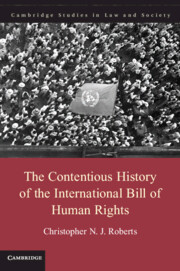Book contents
- Frontmatter
- Contents
- Preface
- Acknowledgments
- Introduction
- Chapter 1 What Are Human Rights and Where Do They Come from?
- Chapter 2 From War and Politics to Human Rights: The Cold War and Colonial Recession
- Chapter 3 Protecting State Sovereignty from the “Dangers” of Human Rights
- Chapter 4 Saving Empire: The Attempt to Create (Non)-Universal Human Rights
- Chapter 5 A Human Rights Treaty that Permits Lynching?
- Chapter 6 The United States’ Unequivocal Ambivalence toward Socioeconomic Rights
- Epilogue
- Index
- References
Introduction
Published online by Cambridge University Press: 05 November 2014
- Frontmatter
- Contents
- Preface
- Acknowledgments
- Introduction
- Chapter 1 What Are Human Rights and Where Do They Come from?
- Chapter 2 From War and Politics to Human Rights: The Cold War and Colonial Recession
- Chapter 3 Protecting State Sovereignty from the “Dangers” of Human Rights
- Chapter 4 Saving Empire: The Attempt to Create (Non)-Universal Human Rights
- Chapter 5 A Human Rights Treaty that Permits Lynching?
- Chapter 6 The United States’ Unequivocal Ambivalence toward Socioeconomic Rights
- Epilogue
- Index
- References
Summary
I
The Great Hall was transformed for the occasion. The theater was made over into an assembly hall, its balcony became the media gallery, and proscenium the speaker’s rostrum where now in December of 1948 the United Nations representatives appeared in turn to offer their closing remarks about the Universal Declaration of Human Rights (UDHR) and the nature of the human rights within it. After nearly two years of drafting, hundreds of meetings, and countless proposed articles and amendments, the delegations would cast their votes in a matter of hours for the document that has become a symbol of human dignity, peace, and unity in the modern world. As unassailable, obvious, and natural as these principles now appear, it is easy to overlook the fact that every word and phrase within the Universal Declaration is awash in the conflict that defines the modern epoch.
A number of the UN representatives found their muses in a distant and turbulent past, reminding those in attendance that they were witnesses to an historic event in the very place where more than a century and a half before, the cries for liberty, equality, and fraternity rang out in the streets and squares calling the French Declaration of the Rights of Man into being.
- Type
- Chapter
- Information
- Publisher: Cambridge University PressPrint publication year: 2014

